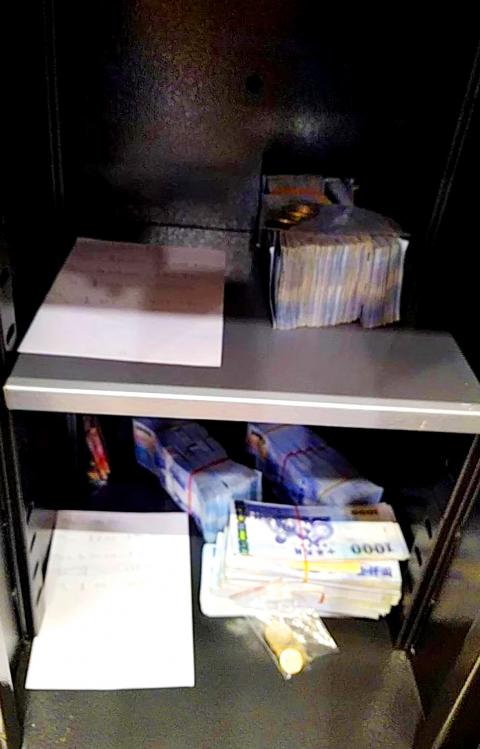Police raids in several cities have closed down a major international gambling syndicate, the largest-known underground bank for remittances between Taiwan and China, and the focus of an ongoing investigation into wagers on the Jan. 11 presidential election.
Investigators said that they on Wednesday detained the suspected backer and proprietor of the syndicate, a 50-year-old man surnamed Hsiao (蕭), who has extensive business and real-estate holdings in Chiayi County and central Taiwan, along with Hsiao’s suspected business partner, a man surnamed Lai (賴), who is in his 40s.
Hsiao, who remains in custody, was subpoenaed along with more than 100 people, including syndicate members, witnesses and regular betting customers, police said, adding that Lai fled to the Philippines, where the syndicate had also established a betting office.

Photo courtesy of the Chiayi District Prosecutors’ Office via CNA
The Chiayi District Prosecutors’ Office, which is coordinating the probe, conducted the raids, gathering evidence and serving subpoenas, with law enforcement units in 72 localities — including Taipei, Chiayi, Taoyuan, Taichung and Kaohsiung.
The case is related to another Chiayi-based underground bank, led by a man surnamed Wu (吳), which in the year prior to an August raid conducted NT$8 billion (US$264.9 million) in money transfers and remittances between Taiwan and China, Chiayi head prosecutor Tsai Ying-chun (蔡英俊) said.
Hsiao was allegedly the “big boss” of Wu’s operation, Tsai said, adding that Hsiao’s syndicate and an affiliated underground bank transferred NT$13.9 billion, mostly from China to Taiwan.
As of yesterday, Chiayi prosecutors had listed Hsiao, Lai and 20 other people as suspects who could be charged with breaches of the Banking Act (銀行法) and the Money Laundering Control Act (洗錢防制法), as well as illegal gambling offenses under the Criminal Code.
The probe is shifting its focus to Hsiao’s China money connection and an election gambling pool that allegedly provides financial and political support from China for Kaohsiung Mayor Han Kuo-yu (韓國瑜), the Chinese Nationalist Party’s (KMT) presidential candidate, Tsai said.
According to a man surnamed Shih (施), who said that he bet on the outcome of the presidential election, the gambling pools favor President Tsai Ing-wen (蔡英文) with a “point spread” — meaning she would lead by that number of votes — of more than 700,000, and up to 1 million in some pools.
However, the house can offer an unreasonably high return to players limiting their wager to Han beating the spread, Shih said, adding that this encourages people to persuade their family and friends to vote for Han so that he hopefully beats the spread, wins the election and makes them rich.
This was allegedly how gambling pools backed by Chinese money helped Han beat former Democratic Progressive Party legislator Chen Chi-mai (陳其邁) in last year’s Kaohsiung mayoral election, as city residents bet NT$1,000 on Han’s victory at even odds and were offered 10 times that in winnings, Shih said.
Wednesday’s raids seized 67 desktop and notebook computers, about 200 cellphones and more than 200 USB drives, as well as NT$5.45 million of local currency and NT$960,000 of foreign currency, six luxury vehicles and 16 diamonds — with the largest one having an estimated value of NT$6 million.

A Chinese aircraft carrier group entered Japan’s economic waters over the weekend, before exiting to conduct drills involving fighter jets, the Japanese Ministry of Defense said yesterday. The Liaoning aircraft carrier, two missile destroyers and one fast combat supply ship sailed about 300km southwest of Japan’s easternmost island of Minamitori on Saturday, a ministry statement said. It was the first time a Chinese aircraft carrier had entered that part of Japan’s exclusive economic zone (EEZ), a ministry spokesman said. “We think the Chinese military is trying to improve its operational capability and ability to conduct operations in distant areas,” the spokesman said. China’s growing

Nine retired generals from Taiwan, Japan and the US have been invited to participate in a tabletop exercise hosted by the Taipei School of Economics and Political Science Foundation tomorrow and Wednesday that simulates a potential Chinese invasion of Taiwan in 2030, the foundation said yesterday. The five retired Taiwanese generals would include retired admiral Lee Hsi-min (李喜明), joined by retired US Navy admiral Michael Mullen and former chief of staff of the Japan Self-Defense Forces general Shigeru Iwasaki, it said. The simulation aims to offer strategic insights into regional security and peace in the Taiwan Strait, it added. Foundation chair Huang Huang-hsiung

PUBLIC WARNING: The two students had been tricked into going to Hong Kong for a ‘high-paying’ job, which sent them to a scam center in Cambodia Police warned the public not to trust job advertisements touting high pay abroad following the return of two college students over the weekend who had been trafficked and forced to work at a cyberscam center in Cambodia. The two victims, surnamed Lee (李), 18, and Lin (林), 19, were interviewed by police after landing in Taiwan on Saturday. Taichung’s Chingshui Police Precinct said in a statement yesterday that the two students are good friends, and Lin had suspended her studies after seeing the ad promising good pay to work in Hong Kong. Lee’s grandfather on Thursday reported to police that Lee had sent

A Chinese ship ran aground in stormy weather in shallow waters off a Philippines-controlled island in the disputed South China Sea, prompting Filipino forces to go on alert, Philippine military officials said yesterday. When Philippine forces assessed that the Chinese fishing vessel appeared to have run aground in the shallows east of Thitu Island (Jhongye Island, 中業島) on Saturday due to bad weather, Philippine military and coast guard personnel deployed to provide help, but later saw that the ship had been extricated, Philippine navy regional spokesperson Ellaine Rose Collado said. No other details were immediately available, including if there were injuries among